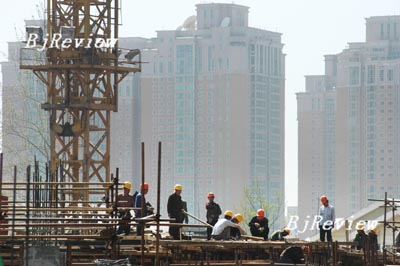
Ten days after the announcement made by the State Council to cut the interest tax rate from 20 percent to 5 percent and that by the central bank to raise the interest rate by 0.27 percentage point, on July 30 the central bank, for the sixth time this year, ordered lenders to retain 0.5 percent more reserves with the central bank as of August 15.
The move raises the reserve requirement to 12 percent, the second highest in 10 years.
Earlier measures of the government to curb excess liquidity include three interest rate hikes, reduction of export tax rebates and issuance of 1.55 trillion yuan in treasury bonds.
Wang Ming, a retired worker in Beijing, has no idea what "excessive liquidity" is, but he has experienced recent financial strain partly caused by the ripple effect of liquidity in the economy.
Wang lives in the Xuanwu District in the southern part of Beijing where housing prices are relatively lower than other parts of the capital. In 2001, Wang's pension was 2,500 yuan a month, and the housing price was about 5,000 yuan per square meter. Presently, Wang's pension stands at 3,200 yuan each month, while the housing price has soared to over 12,000 yuan per square meter.
Chinese elderly citizens have retained a deep-rooted belief in saving money for their later years since the days of their youth. With an immature social security system and few investment channels, saving money was the only way to finance their lifestyle in old age. Wang Ming did the same thing.
However, Wang has changed his money managing ways these days. "I've bought stocks, mutual funds and property, trying nearly every method, and each one is more worthy than putting money in the bank," said Wang.
Wang said he was forced to invest his savings in the market, explaining the reason that "everything is becoming more expensive and bank deposits are depreciating."
Wang is an example of what many Chinese are confronted with these days. Excessive liquidity reverberates through the entire financial system, reflected in the increasing money supply, excessive capital in the commercial banking system, skyrocketing housing prices, and rapid increases in the stock index.
Trade surplus ills
There are many reasons for excessive liquidity in China, but the culprit most often pointed to is massive foreign reserves--which mainly come from the bloated trade surplus. Lou Gang, an analyst with Morgan Stanley, pointed out three factors that drive excessive liquidity: the trade surplus, foreign direct investment (FDI) and speculative capital.
In recent years, China has experienced double surpluses in its international balance of payment current account and capital account surpluses. Central bank statistics show that in 2006, the country's current account surplus stood at $249.9 billion and the capital account surplus amounted to $10 billion.
The Chinese trade surplus surged to $112.5 billion from January to June this year, more than the total trade surplus of 2005 and two-thirds the total of 2006. The current figure is 83.1 percent higher than it was during the same period last year.
The expanding trade surplus is also a major contributor to the increase in foreign exchange reserves. According to China's current foreign exchange management system, foreign currencies possessed by businesses and individuals cannot be traded or consumed in the domestic market and have to be converted to renminbi for the purpose of consumption. In addition, beyond-quota foreign exchange acquired by enterprises must be sold to the central bank through commercial banks, which also helps increase the country's foreign exchange reserves.
Accoring to the State Administration of Foreign Exchange, in the first half of this year, China's foreign exchange reserves grew by $266.3 billion, boosting the total net increase over the past five years to $1 trillion.
In order to curb the growing foreign exchange reserves, the central bank has to use renminbi to purchase them, causing abundant money supply in the circulation system.
"It is very important to lead the money out," Lou Gang said. "Under such circumstances, government-led investment will grow significantly. The establishment of the State Foreign Exchange Reserve Investment Co. demonstrates the government's decision to diversify the money."
| 